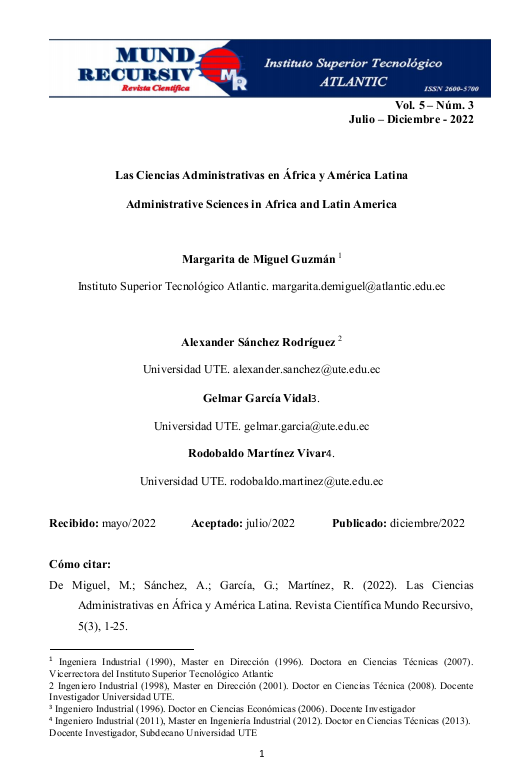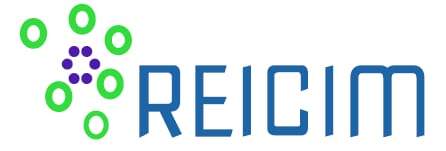Las Ciencias Administrativas en África y América Latina
Palabras clave:
Ciencias Administrativas, África, América LatinaResumen
Caracterizar la situación existente en determinada temática debe ser siempre un paso clave para poder diseñar acciones de mejora de una posición a transformar. De acuerdo con esta premisa esta investigación presenta un análisis comparado de las investigaciones desarrolladas por los investigadores de ciencias administrativas en el las regiones de América Latina y África. Para este propósito se realiza un análisis de las publicaciones sobre Ciencias Administrativas de investigadores del continente reportadas en Scopus. Luego de una revisión inicial del 100% de estas publicaciones se trabaja con cerca del 87 % de estas definiendo las funciones o áreas del conocimiento donde estas se desarrollan, de igual modo se analiza la evolución en el tiempo y los sectores y países donde las mismas se aplican. Además, se caracterizan algunos elementos relativos a los vínculos de colaboración entre los países en función del desarrollo de las investigaciones, las principales revistas donde se han publicado los resultados investigativos y el comportamiento de los autores con mayores números de publicaciones
Citas
Aguilar-Gordon y Heredia-Guzman (2019). Fundamentos y desafíos de la calidad en la educación superior ecuatoriana. Aseguramiento de la calidad de la educación superior. Debates y experiencias. CACES. ISBN 978-9942-8665-3-4. 227pp.
Baldwin, A., Shen, G. Q., & Brandon, P. (2009). Introduction: Collaborative construction information management - evolution and revolution. [Editorial]. Collaborative Construction Information Management, 9780203883631, 1-17. doi: 10.4324/9780203883631
Batista-dos-Santos, A. C., De Alloufa, J. M. L., & Nepomuceno, L. H. (2010). Epistemology and methodology for critical researches in management: Approximate readings of Horkheimer and Adorno. [Article]. RAE Revista de Administracao de Empresas, 50(3), 312-324. doi: 10.1590/s0034-75902010000300007
da Costa, A. S. M., Barros, D. F., & Martins, P. E. M. (2010). Historical perspective in management: New objects, new problems, new approaches. [Article]. RAE Revista de Administracao de Empresas, 50(3), 288-299. doi: 10.1590/s0034-75902010000300005
Felix, R. (2003). A Proposed Taxonomy of Management Systems. [Article]. Systems Research and Behavioral Science, 20(1), 21-29. doi: 10.1002/sres.523
Felzensztein, C., Crick, D., Gonzalez-Perez, M. A., Jurado, T., & Etchebarne Lopez, M. S. (2020). Capabilities and the internationalisation of smaller-sized, service-oriented firms in the southern hemisphere. [Article]. Journal of Strategic Marketing. doi: 10.1080/0965254x.2020.1815235
Guerra Betancourt, K., de Zayas Pérez, M. R., & González Guitián, M. V. (2013). Bibliometric analysis of publications related to innovation projects and their management in Scopus, 2001-2011. [Article]. Revista Cubana de Informacion en Ciencias de la Salud, 24(3), 281-294.
Hamid, S. R., Isa, S., Chew, B. C., & Altun, A. (2019). Quality Management Evolution from the Past to Present: Challenges for Tomorrow. [Article]. Organizacija, 52(3), 157-186. doi: 10.2478/orga-2019-0011
Ibarra-Colado, E. (2008). Is there any future for critical management studies in Latin America? Moving from epistemic coloniality to 'trans-discipline'. [Article]. Organization, 15(6), 932-935. doi: 10.1177/1350508408095822
Jurado, J. C. J. (2018). Authority. Conceptual implications in management theories. [Article]. Cuadernos de Administracion, 31(56), 81-104. doi: 10.11144/Javeriana.cao.31-56.adcta
Juran, J. M. (2002). Quality glossary will benefit many [5]. [Letter]. Quality Progress, 35(10), 12.
Obedgiu, V. (2017). Human resource management, historical perspectives, evolution and professional development. [Review]. Journal of Management Development, 36(8), 986-990. doi: 10.1108/jmd-12-2016-0267
Oliveira, R. R., & Martins, H. C. (2019). Project management office performance: Divergence of the perceptions between academic instruction and professional experience. [Article]. Innovar, 30(75), 119-134. doi: 10.15446/innovar.v30n75.83261
Ormazabal, M., Rich, E., Sarriegi, J. M., & Viles, E. (2017). Environmental Management Evolution Framework: Maturity Stages and Causal Loops. [Article]. Organization and Environment, 30(1), 27-50. doi: 10.1177/1086026615623060
Paucar-Caceres, A., & Jerardino-Wiesenborn, B. (2020). A bridge for two views: Checkland’s soft systems methodology and Maturana’s ontology of the observer. [Article]. Journal of the Operational Research Society, 71(4), 660-672. doi: 10.1080/01605682.2019.1578629
Queiroz, M. M., Fosso Wamba, S., Machado, M. C., & Telles, R. (2020). Smart production systems drivers for business process management improvement: An integrative framework. [Article]. Business Process Management Journal, 26(5), 1075-1092. doi: 10.1108/bpmj-03-2019-0134
Shen, W., Hu, D., Günay, E. E., & Okudan Kremer, G. E. (2020). Evolution of supply chain management: A sustainability focused review. [Article]. International Journal of Sustainable Manufacturing, 4(2-4), 319-335. doi: 10.1504/ijsm.2020.107131
Silva, F. P., De Freitas, L. S., Cândido, G. A., Santos, D. B., Santos, D. A. S., & Macedo, L. O. B. (2016). Theoretical models of corporate social responsibility and corporate social performance: An analysis from the decade 1950-2000. [Article]. Espacios, 37(2).
Thaichon, P., Liyanaarachchi, G., Quach, S., Weaven, S., & Bu, Y. (2019). Online relationship marketing: evolution and theoretical insights into online relationship marketing. [Article]. Marketing Intelligence and Planning, 38(6), 676-698. doi: 10.1108/mip-04-2019-0232
Wu, W., Liang, Z., Zhang, Q., & Zhang, H. (2020). Coupling relationships and synergistic mechanisms between technology management capability and technological capability in product innovation: a simulation study. [Article]. Technology Analysis and Strategic Management, 32(9), 1098-1112. doi: 10.1080/09537325.2020.1743261
Zanon, L. G., Ulhoa, T. F., & Esposto, K. F. (2020). Performance measurement and lean maturity: congruence for improvement. [Article]. Production Planning and Control. doi: 10.1080/09537287.2020.1762136










